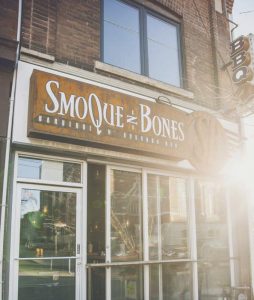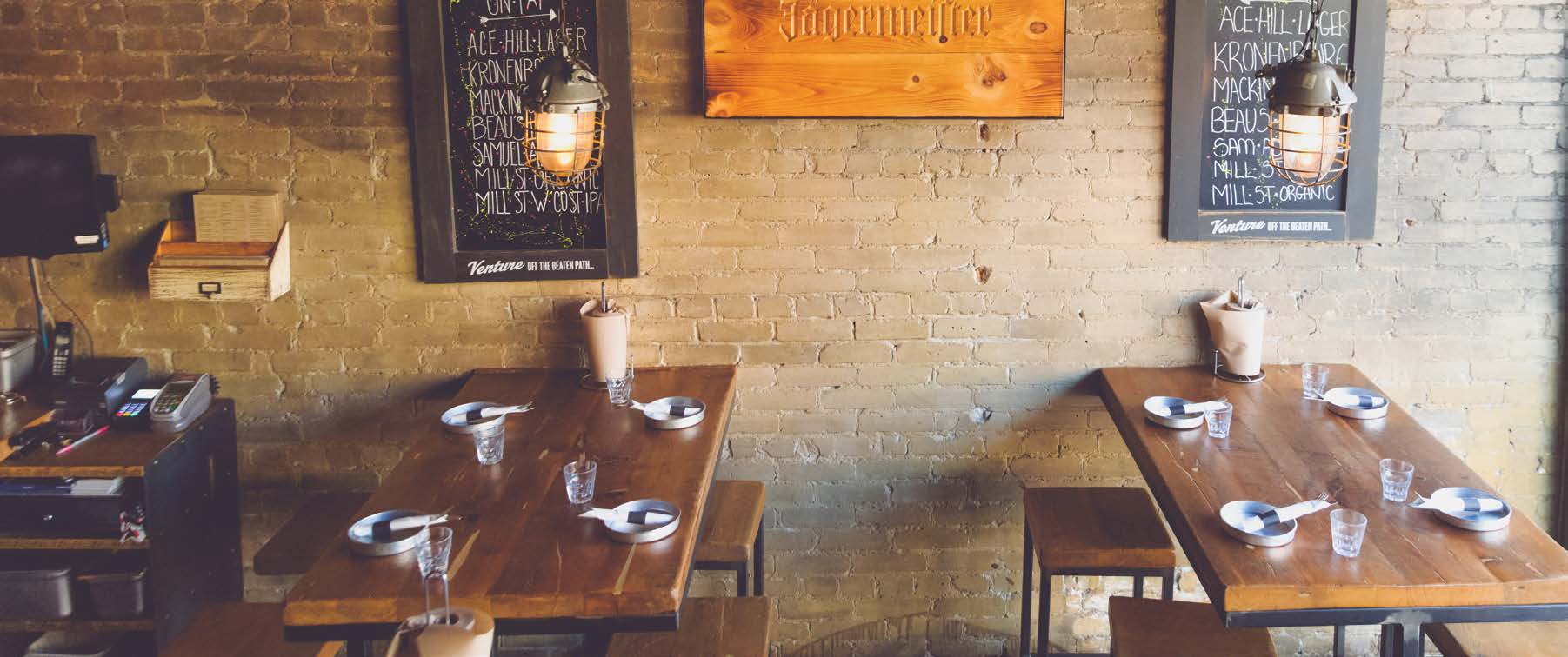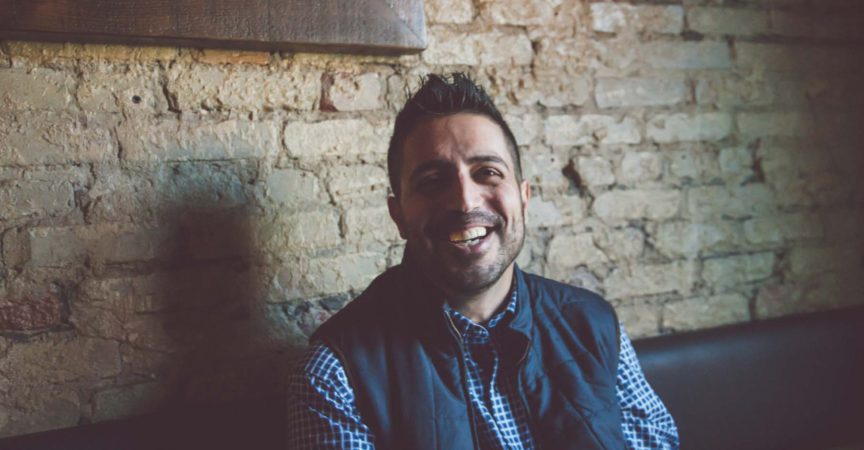Chef Alex Rad of Smoque N’ Bones is a work in progress (aren’t we all?)
Chef Alex Rad meets me at the door of the second-floor whisky room of his restaurant, Smoque N’ Bones. He shakes my hand, and together we walk to a table where we hunker down for a long chat. He sits across from me. He has pushed his walker to the side of the table before sitting. To look at him, you wouldn’t know that this is a man who broke his neck in a catastrophic accident just months earlier. But making assumptions about a person based on their appearance is just one of the problems Rad wants to tackle.
Rad was born in Tehran just before the Iranian Revolution. His father was in politics and had roles with the government. Then the revolution hit. Rad says that most of his family left the country. Some of those who stayed behind were imprisoned or executed. He grew up in Turkey and Germany. His family was dispersed across the globe. His father couldn’t leave the country initially. His older brother had left Iran and was living in England. “My mom rebuilt our life. All the women in our family rebuilt our lives.” It was difficult for Alex, trying to fit into so many different cultures. He was bullied and he got into trouble. But, he also learned to adapt. “I saw my dad just once after I left. My dad used to say ‘if you can’t roll up your sleeves and adapt, you’re going to die.’”
Rad explains that in the culture in which he was raised, he was expected to be a doctor, lawyer or to do something in business. So, he studied corporate finance. Then his father passed away. “I wanted to own a restaurant. I grew up in restaurants. My brother is a VP in an American chain. My father had restaurants and hotels after the revolution.”
Rad reminisces about everything that led him to where he is today. He was loved and protected in his family, but at times lonely. He was emotional, artistic, intuitive and drawn to people but highly-driven and he maintained high expectations of himself and of others. He made some business decisions that left him at rock bottom.
THE FOOD
Why barbecue? “I think it is humble food. If you throw a barbecue at home, you invite your entire family. It brings people together. I like that idea. I enjoy being around people, it is what helped me survive all these years, being around people,” says Rad.
Did Rad know how to cook? No. But he was going to learn. “I was excited, I called Southern Pride, bought a smoker. I was interested in sandwiches.” Rad once again began researching; he fed his neighbourhood—a hungry and willing focus group—while he taught himself to be a chef. “I used to cook all night long, hosting barbecues on my street.”
There are four primary barbecue regions in the US—Texas, Carolina, Memphis and Kansas. “I didn’t want to be disrespectful. I realized how deep barbecue runs in America. Especially with Texas.” Rad saw the flaws in his concept—and he adapted. He needed to really understand the food. He didn’t have the means to travel. But he ate at every other barbecue place he could find. He would eat the entire menu. Then he built his business model based on his research, and on his “own style of barbecue, inspired by a little bit from every region, with a Canadian twist.”
FINDING THE SPOT

Everywhere that Rad wanted to open, he couldn’t afford. “I looked at so many places, nobody wanted to touch me. I had no brand, no collateral, landlords assumed barbecue would be smoky…it was an uphill battle. I saw this place…it was a pizza spot. It didn’t fit to the neighbourhood.” He drove back the next week and saw a sign that it had closed. He found the landlord and the agency handling the location but the landlord wasn’t comfortable giving it to another food place. “The building meant a lot to her…She had inherited it. She met with me on four occasions. I literally begged her. I promised her my concept would do well.” Rad was involved in every part of building his restaurant—the food, the menu, the staff. He even jackhammered the walls himself; he points out a nearby imperfection, a jagged hole in the brick.
During those first days, he made his potato salad recipe and he invited passersby in to taste and review his food. Rumours flew in the neighbourhood about “some crazy guy giving away free food.” But the tactics worked.
In Farsi there is an expression, ‘you give yourself rosy cheeks by slapping yourself.’ Rad did everything he needed to do to make the restaurant work.
He had started major construction in December of 2013, and he opened officially in May of 2014. “The minute we ended up opening, everyone was supportive…the community, my clientele.” The menu is small and exactly what Rad envisioned. His original, from-scratch recipes and foods. Simple, hearty, excellent…and award-winning.
CALAMITY
In January 2017, Rad was feeling burnt out and in need of a restorative retreat. He was single and planned to travel solo but he was convinced by friends to meet up with them in Aruba. He found a quiet Airbnb rental, where he would play with some recipes, cooking for pleasure. He wanted to lose some weight so he planned an exercise regime. For the first few days he established a routine of going for a good run, and then a dip in the ocean. He wanted to come home restored, and with a second location in mind for Smoque N’ Bones. He was ready for the next step in the evolution of his business.
“I remember the first three nights. It was beautiful…I wanted to be in a happy state of mind, relaxed. I would do the same jog, drive to the tourist area, run to the beach.” Something went wrong the fourth day when he dove into the ocean. Rad says that he remembers the dive, because he has flashbacks. “The chance of a sandbank being in that depth…” Rad’s voice trails off and his voice wavers. He apologizes for becoming emotional. He tells me that he was an experienced, strong swimmer. He did a shallow dive in the area he had dived previously.
I hit and something went [cracking sound] and it echoed in my head. It was hard to come out of the water but I rose up, I realized I can’t reach the ground. I swam out of the water.
The doctors told Rad they can’t understand how he managed to swim out of the water; saying that he should have drowned. Rad had dived headfirst into a sandbank, in water that was otherwise well over his head. He had broken his arm and shoulder, dislocated his other shoulder. He broke his C3, C4 and C7 vertebrae. His thoracic vertebrae—shattered. For whatever reason, fight or flight said the doctors, Rad managed to swim out of the water. But when he stood up to walk, he felt like he was swaying. He felt nauseous and then he collapsed on the beach surrounded by his friends who had planned to meet him there after his run, and strangers. Rad was in and out of consciousness. He was transported to a local hospital. Then he was flown to Martinique for emergency treatment. From there he was transported to Mount Sinai Hospital in Toronto. The memories he has, of being treated in various hospitals and being transported by helicopter between nations, are intermittent and unclear. Rad’s brother went to stay in Toronto. Rad finally regained consciousness. He was told that he had been in an accident, he had broken his neck and he was paralyzed. “I couldn’t stop crying.” His brother gave up six months of his own life to care for Rad. Rad saw his mother after the accident. “My accident brought the family together.”

He spent months in acute rehabilitation. He credits the staff at Mount Sinai for saving his life. “What they did for me, especially my nurses…some of them are going to be my friends for life. I couldn’t talk, um, I had no vocal cords. What my ICU did for me…is beyond reason. And uh, I owe my life to them.” Rad once again apologizes for his tears. He names some of his primary ICU team members, Jody, Sonya, Matt. He also talks about how differently he has been treated as a person with physical challenges. Rad says that many people saw the wheelchair first, and then him. He intimately understands what it means to be looked at as “disabled.” The irony: those with physical challenges endure and overcome much more in their daily lives than people without physical challenges. Rad says that rehab is more than a full-time job, on top of his work and his everyday life. He falls asleep so early some nights from sheer exhaustion.
Rad was on life support for almost 40 days and he developed pneumonia. He coded more than once, and was brought back. He was told how damaged he was. But like all the times in his life when he had been faced with adversity, Rad refused to accept the limitations placed upon him. He had to relearn how to live, he says he was “like a little baby learning to do everything all over again.” He entered acute care in April and he met each milestone in rehabilitation earlier than expected. But he also talks about his time in rehab as a difficult time; that he was overwhelmed with getting back to normal while life continued to happen all around him. How does a person return to normal life and his business after such calamity? Rad credits his brother, his key staff and a very local clientele with keeping his business going while he healed. And he is still healing.
Rad describes being angry with himself for taking the trip to Aruba. But then he shows me a photo of himself from the hospital that he keeps on his phone as a reminder of just how far he has come. He talks about the lessons he has learned through this experience—that adversity has a way of reordering our priorities. “As a young person I wanted to get married and have a family, and it never came my way. But through all of this, I met someone…I ended up meeting this girl, and it’s like she didn’t see the wheelchair. It didn’t matter to her.” Rad refers to her as an angel, his angel. She brings out the best in him, giving him a reason to battle through the challenges that await.
Rad’s father always taught him to treat people “how you like to be treated: I truly believe that, I live by it. Unfortunately, I haven’t always gotten that in return. You get to meet good people and some people who take advantage of you. I have learned that in my recovery.”
He is no longer in a wheelchair; Rad uses a walker to move. He is climbing stairs and has returned to being in the restaurant when he can be. “The restaurant means a lot to me; my brand needs my attention.” Rehab is expensive and a full-time job. Accepting and adapting to this new normal, he wakes up each morning and tells himself that “it’s going to be okay.” He puts on his game face and he does it again.
Chef Alex Rad is putting a new team together and back to business at Smoque N’ Bones.









